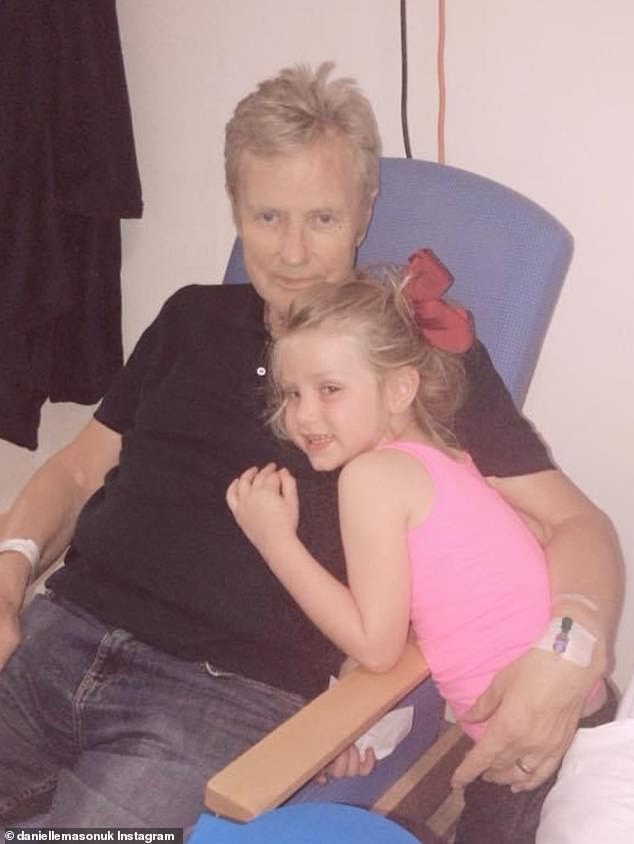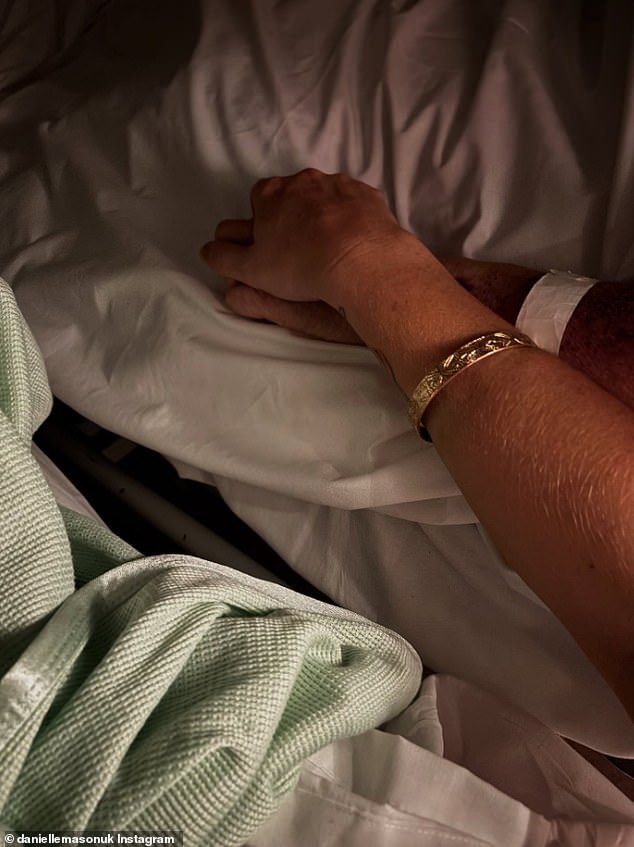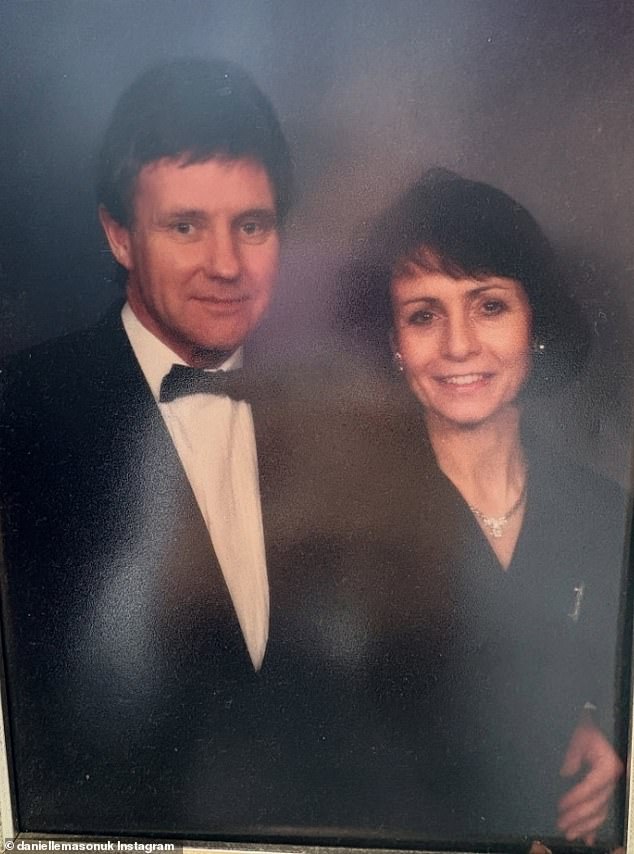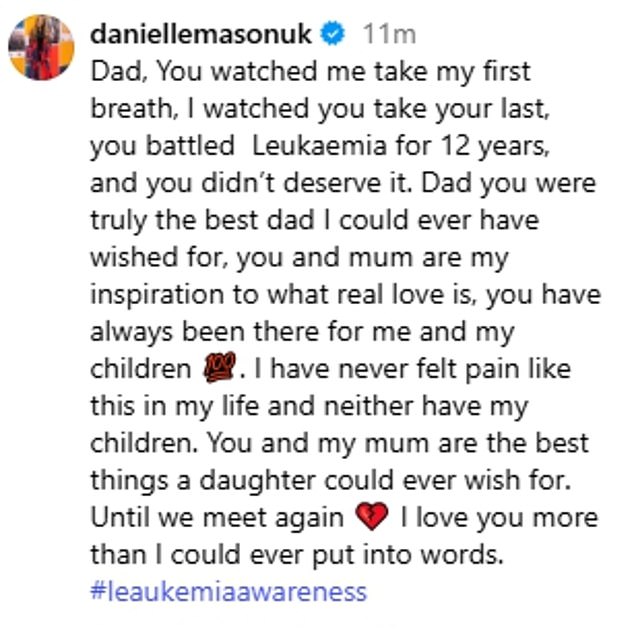Have YOU got a story? Email tips@dailymail.co.uk
Jessie Wallace‘s sister Danielle Mason has revealed her father Ronald has died after a long 12-year battle with leukaemia.
The TV presenter, 42, announced the heartbreaking news via her Instagram page on Wednesday, saying ‘I have never felt pain like this in my life’.
Sharing several photographs of her father over the years, Danielle captioned the post: ‘Dad, you watched me take my first breath, I watched you take your last, you battled leukaemia for 12 years, and you didn’t deserve it.
‘Dad you were truly the best dad I could ever have wished for, you and mum are my inspiration to what real love is, you have always been there for me and my children.
‘I have never felt pain like this in my life and neither have my children. You and my mum are the best things a daughter could ever wish for.
‘Until we meet again (heartbroken emoji) I love you more than I could ever put into words. #leaukemiaawareness.’

Jessie Wallace’s sister Danielle Mason has revealed her father Ronald has died after a long 12-year battle with leukaemia

The TV presenter, 42, announced the heartbreaking news via her Instagram page on Wednesday, saying ‘I have never felt pain like this in my life’
Tributes poured in for Ronald, who had been married to Jessie’s mother, Annette, for over 30 years.
Commenting on Danielle’s post, one fan wrote: ‘Sending love with a big hug (heart emoji)’;
‘Sending you so much love gorgeous’; ‘Sending love my darling x’; ‘Sending you love baby girl… it’s the hardest thing to process when your parents pass xx sending you love and light to you and your family!’
Ben Ofoedu wrote: ‘I’m so sorry to hear this my heart, prayers and thoughts are with you (prayer hands emoji)’
Leukaemia is a type of blood cancer that affects blood cells in your bone marrow, usually white blood cells.
Bone marrow is a spongy tissue found inside some of your bones, and it’s where the body produces blood cells.
With leukaemia, blood cells are not produced the way they should be, and some people may have too many, too few, or blood cells that don’t work properly.
There are different types of leukaemia depending on the type of blood cell affected and how the condition develops.




Danielle captioned the post: ‘Dad, you watched me take my first breath, I watched you take your last, you battled Leukaemia for 12 years, and you didn’t deserve it,’



Tributes poured in for Ronald, who had been married to Jessie’s mother, Annette, for over 30 years
Some types are slow-growing (chronic) and some are fast-growing (acute).
Leukaemia symptoms vary depending on the type of condition.
However, some of the common symptoms include tiredness that lasts a long time and doesn’t improve with rest, bruising and bleeding more easily, repeated infections and high temperatures.
As well as unexplained weight loss and swollen lymph nodes (glands in your neck, armpit, and groin)
According to Cancer Research UK, approximately 10,400 new cases of Leukaemia are diagnosed each year in the UK.
Leukaemia is a cancer that starts in blood-forming tissue, usually the bone marrow.
It leads to the over-production of abnormal white blood cells, which fight off infections.
But a higher number of white blood cells means there is ‘less room’ for other cells, including red blood cells – which transport oxygen around the body – and platelets – which cause blood to clot when the skin is cut.
There are many different types of leukaemia, which are defined according to the immune cells they affect and how the disease progresses.
For all types combined, 9,900 people in the UK were diagnosed with leukaemia in 2015, Cancer Research UK statistics reveal.
And in the US, around 60,300 people were told they had the disease last year, according to the National Cancer Institute.
Most cases have no obvious cause, with the cancer not being contagious or inherited.
Leukaemia generally becomes more common with age – the exception being acute lymphoblastic leukemia, which peaks in children.
Other risk factors include being male, exposed to certain chemicals or radiation, and some bone-marrow disorders.
Symptoms are generally vague and get worse over time.
These can include:
TirednessFrequent infectionsSweatsBruisingHeavy periods, nose bleeds or bleeding gumsPalpitations Shortness of breath
Acute leukaemia – which progresses rapidly and aggressively – is often curable via chemo, radiotherapy or a stem cell transplant.
Chronic forms of the disease – which typically progress slowly – tend to incurable, however, these patients can often live with the disease.
Source: Leukaemia Care
Share or comment on this article:
Jessie Wallace’s sister Danielle Mason reveals her father has died after a 12-year battle with leukaemia and says ‘I have never felt pain like this in my life’
